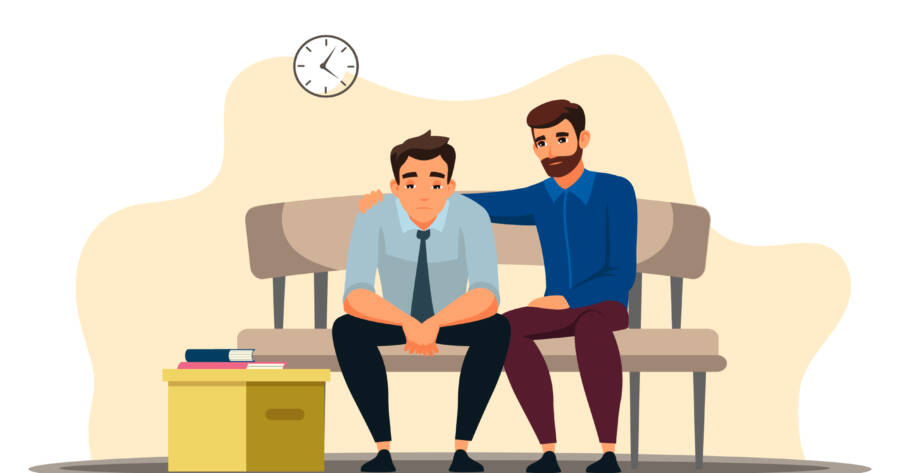Receiving a pink slip from your employer is a tough reality that almost everyone has to face at least once. No matter the reason for your job loss, it’s incredibly difficult to have the rug pulled out from under you. You may experience a feeling of hopelessness, not knowing exactly what to do next to make sure your finances don’t end up in ruins. It’s important to not let the shock of your new situation overwhelm you. That just creates more unneeded stress. Try not to worry, because you (and your family and finances) can all survive this bout of bad employment luck. Just make sure you take the proper steps to stay on top of your finances as you seek out the next chapter of your career. Here’s what to do if you lose your job.
Register for Unemployment
Before you’ve packed up your family photos from your desk, make sure that you spend some time with the HR department. Make sure to get all your unemployment questions answered prior to leaving the last time. That will help you when you log onto the unemployment website for the first time. Remember, that is part of Human Resources’ job — helping people transition after a job loss.
You will generally be eligible for no more than 26 weeks of unemployment benefits. You’ll likely have to meet some basic requirements in order to be eligible. The pandemic also offered additional benefits and extended the standard time you are eligible for unemployment checks so cheer up, as not all news is bad.
Examine Your Budget for Leaks
Everyone in the family should sit down and decide which expenditures are wants and which are needs. Depending on what kind of savings cushion or emergency fund you have, you might have to be willing to give up some of the things you normally take for granted. That could mean your streaming services or trimming back on the sports TV packages. Take a long look at your list of needs. Then, separate the real necessities and others that are just wants disguised as needs.
If you have children, this may not be an easy discussion to have. Still, it’s better to explain it to them in an age-appropriate way rather then have them wonder why Mom and Dad are so stressed all of a sudden. You might be surprised to see how creative kids are in finding ways to cut spending. The episode, while painful, is also a great learning lesson for your children.
Keep Your Health Insurance Going
The Consolidated Omnibus Budget Reconciliation Act (COBRA) provides you a way of continuing the health coverage you carried as an employee (provided that you worked for a company with 20 or more employees). You will pay the entire premium that your company paid for you, plus 2%. It’s not the greatest deal in the world, but at least you be able to continue receiving the same coverage.
Also check out the Affordable Care Act (ACA) marketplace for healthcare plans. With subsidies, there’s a chance you could end up paying less than you would when you had the employer subsidized plan. Congress also passed additional help for those who are using healthcare plans in the ACA market place, so definitely check this option out. Hopefully, this is only temporary until you land your next job. Regardless, maintaining health benefits for you and your family should remain a priority.
Don’t Treat Credit Like a Safety Net
For many families, it will simply be easier to pull out the plastic to continue living the same lifestyle as when everyone was gainfully employed. You’ll just pay the credit card off when you find another job, you tell yourself. This can be a huge mistake though. Life is full of surprises and uncertainties. There’s no telling how long you might stay unemployed or what kind of salary you’ll be making when you do find a replacement gig. You don’t want to start your next job already up to your ears in debt. The only reason you should be using a credit card after a job loss if there is simply no other way to pay for an absolute necessity.
Pull up the online account summary for your credit card. See that annual percentage rate (APR) for purchases? If you’re lucky, it might be 12-to-15%. Most cards hover in the 18-to-24% range though. A number like 20.99% means that you are going to pay 20.99% more on every purchase after one year, and more than 40% after two. The interest charged on the interest is what gets many people in trouble. Don’t join the crowd here. That’s the wrong group of people to associate yourself with!
 Shutterstock
ShutterstockFigure Out What You Want to Do with the 401(k)
Hopefully, you’ve accumulated a decent amount of money in a 401(k) from your former employer. Whether it’s a lot or a little, you need to decide the fate of the funds inside. If there’s only a small amount, it’s probably best to just roll the money over into an IRA so that you have fewer accounts to manage.
If there’s a substantial amount in the account, then there are a few options you should consider. You can still move to an IRA, but you might want to keep it with the old employer if there are really good investment options you can’t quite get with your own IRA. You can also withdrawal the money if you desperately need it to pay the bills, but you’ll take a hefty hit on the taxes. You should keep the money invested unless you really have no other choice.
Don’t Touch Your Retirement Savings
I know I just said this, but I’m going to say it again. Don’t withdraw money from your retirement savings to float you through unemployment. Yes, it can be scary and stressful to lose your job. It’s certainly tempting to tap into your retirement account to get by. After all, it’s your money, just sitting there. However, you won’t be unemployed forever. Your time out of work will not last nearly as long as your retirement will. So have faith in yourself that you’ll get back on your feet soon. Just let your retirement funds be.
Note that the one-year penalty exemption on retirement account withdraw because of COVID was for the year 2020 only. This means that we are already back to having to pay taxes on any amount you take out plus a 10% penalty (plus state penalties). Repeat after me. “Don’t do it!” That money will be worth much more in the long run, when you need it most. And trust me, you’ll need it more in your 70s and 80s than you do right now.
Look at Your Tax Situation
Having less income for part of the year may be just the ticket you need to save a bunch of money. How? You may be able to win long term by converting part of your pre-tax funds into post-tax without paying much.
Known as Roth Conversions, you can convert any amount in an IRA into a Roth IRA by paying taxes for the year you do the conversion. The problem is that this move usually increases the taxpayer’s adjusted gross income so much that they end up paying a ton in taxes. However, those who are unemployed will have a few months of low (or zero) income. Do the math to see if it makes sense. This transitionary period could be the perfect time to get more assets into the forever tax-free zone.
Brush Up Your Resume
Everyone says you should always keep your resume updated — even when you are employed. But who are we kidding? Chances are extremely high that you haven’t looked at your resume since last time you needed to find a job. No worries though. Now is the time to brush up that CV and update everything you’ve accomplished since the last job hunt.
Don’t forget the online profiles on sites like LinkedIn as well. Do the legwork to spruce them up. Then reach out to your network and let everyone know you are hunting for work. You may not get a hit right away, but it will increases your chances. It’s also a good way to catch up with old friends.
Start a Side-Hustle
Is there a side hustle idea you’ve been meaning to get going, but you just haven’t had the time? Being unemployed presents the perfect opportunity to start a part time gig. You have more free time than you used to, and you could definitely use the extra money. There’s no time like the present to dig into one of these part-time gigs.
Even if you’ve never thought about moonlighting before, do a search online to get some ideas. You never know. That side hustle may quickly snowball into being a full-time gig. Before you know it, you could be running your own small business instead of working for someone else. Sometimes life has a funny way of working out, so don’t despair. Losing your job might end up being the best thing to ever happen to you.
Consider Learning Something New
There’s always room for improvement. There’s no better time to learn something new than when you are hunting for work. Have you always thought you’d like to go back to school to upgrade your education? Or switch fields? Or learn a skilled trade? A sudden job loss can be the perfect opportunity to seize those dreams.
The possibilities are endless. Don’t underestimate learning a new skill by actually throwing yourself into a side project either. One of my friends wanted to learn blockchain and how cryptocurrency mining worked. He threw himself into mining Ethereum a few years back. He then started learning how to code for the Ethereum blockchain and he’s now one of the most sought-after programmers I know. By getting laid off from one industry, he ended up having the know-how for the hottest new industry on Earth as a software developer.
Stop Neglecting Your To-Do List
Are there any house projects you’ve neglected over the years because you were too tired to tackle them? Now is the perfect time to pare down that list somewhat and cross off a few of the items in there. While it won’t directly help your employment situation, being productive around the house can help keep your mental health in a positive state. You’ll feel productive about painting the shed or finally replace that leaky faucet in the bathroom.
Don’t forget stuff on your bucket list too. The thing about the bucket list is that it’s going to be plenty hard to do everything once you feel the pressure to finish them. Do some while you are healthy and alive and you won’t regret spending the time to take care of yourself and your wishes.
 Shutterstock
ShutterstockSee This Period as a Nice Little Break
It’s hard to be positive while you just lost your job. However, there are plenty of things to be grateful for. The pandemic forced Congress to increase unemployment benefits by a good portion. You also get a chance to rest and work on your physical and mental health. For some, losing your job could be a chance to simply rest, reset, and then figure out your next path. Maybe it’s just the thing you need to finally switch your career and work towards your desired lifestyle.
When I first finished college and couldn’t find work, my dad told me to not get too down on myself. He told me that I definitely wasn’t lucky enough to never need work. What he was was trying to say, I think, is that unemployment is always temporary for those with a strong work ethic and motivation to succeed. You will definitely find another job, but go ahead and enjoy the brief downtime a bit — while it lasts.
The Bottom Line
For many individuals, the huge change brought about by a sudden job loss can turn out to be a blessing in disguise. As tough as that may be to see in the midst of a stressful time, it’s good to remember that wonderful surprises can be lurking around every hardship.
Cross off some stuff on your to-do list, keep job hunting, but more importantly, stay positive. You may look back at this period as one of the best times of your life. You just never know!








